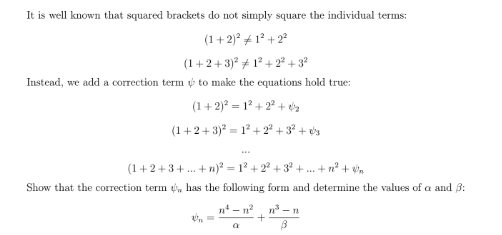
Question and Answers Forum
Question Number 180866 by Mastermind last updated on 18/Nov/22

Answered by mr W last updated on 18/Nov/22
![1+2+3+...+n=((n(n+1))/2) 1^2 +2^2 +3^2 +...+n^2 =((n(n+1)(2n+1))/6) [((n(n+1))/2)]^2 =((n(n+1)(2n+1))/6)+ψ_n ψ_n =((n^2 (n+1)^2 )/4)−((n(n+1)(2n+1))/6) ψ_n =((3n^4 −3n^2 +2n^3 −2n)/(12)) ψ_n =((n^4 −n^2 )/4)+((n^3 −n)/6) ⇒α=4, β=6](Q180870.png)
| ||
Question and Answers Forum | ||
Question Number 180866 by Mastermind last updated on 18/Nov/22 | ||
 | ||
Answered by mr W last updated on 18/Nov/22 | ||
![1+2+3+...+n=((n(n+1))/2) 1^2 +2^2 +3^2 +...+n^2 =((n(n+1)(2n+1))/6) [((n(n+1))/2)]^2 =((n(n+1)(2n+1))/6)+ψ_n ψ_n =((n^2 (n+1)^2 )/4)−((n(n+1)(2n+1))/6) ψ_n =((3n^4 −3n^2 +2n^3 −2n)/(12)) ψ_n =((n^4 −n^2 )/4)+((n^3 −n)/6) ⇒α=4, β=6](Q180870.png) | ||
| ||